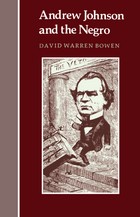
“Bowen has probed the working of Andrew Johnson’s mind. His analysis illuminates the character of East Tennessee’s tailor president and the contradictions—as well as the consistency—of his policies toward slavery and toward blacks.”— LaWanda Cox, author of Lincoln and Black Freedom: A Study in Presidential Leadership
Andrew Johnson, who was thrust into the office of presidency by Lincoln’s assassination, described himself as a “friend of the colored man.” Twentieth century historians have assessed Johnson’s racial attitudes differently.
In his revisionist study, David Bowen explores Johnson’s racist bias more deeply than other historians to date, and maintains that racism was, in fact, a prime motivator of his policies as a public official. A slave owner who defended the institution until the Civil War, Jonson accepted emancipation. Once Johnson became president, however, his racial prejudice reasserted itself as a significant influence on his Reconstruction policies.
Bowen’s study deftly analyzes the difficult personality of the seventeenth president and the political influences that molded him. This portrait of a man who, despite his many egalitarian notions, practiced racism, will intrigue historians and readers interested in Civil War and Reconstruction history alike.
The Author: David Warren Bowen, formerly on the staff of The Papers of Andrew Johnson, teaches history at Livingston University

W. C. Handy waking up to the blues on a train platform, Buddy Bolden eavesdropping on the drums at Congo Square, John Lomax taking his phonograph recorder into a southern penitentiary—some foundational myths of the black vernacular remain inescapable, even as they come under increasing pressure from skeptics.
In Disturbing the Peace, Bryan Wagner revises the history of the black vernacular tradition and gives a new account of black culture by reading these myths in the context of the tradition’s ongoing engagement with the law. Returning to some familiar examples (trickster tales, outlaw legends, blues lyrics) central to previous studies of the black vernacular expression, Wagner uses an analytic framework he has developed from the historical language of the law to give new and surprising analyses.
Wagner’s work draws both on his deep understanding of history and on a wealth of primary sources that range from novels to cartoons to popular ballads and early blues songs to newspapers and court reports. Through his innovative engagement with them, Wagner gives us a new and deeper understanding of black cultural expression, revealing its basis in the relational workings of African Americans in the social world.
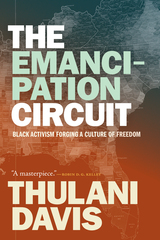
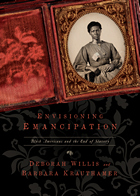
The Emancipation Proclamation is one of the most important documents in American history. As we commemorate its 150th anniversary, what do we really know about those who experienced slavery?
In their pioneering book, Envisioning Emancipation, renowned photographic historian Deborah Willis and historian of slavery Barbara Krauthamer have amassed 150 photographs—some never before published—from the antebellum days of the 1850s through the New Deal era of the 1930s. The authors vividly display the seismic impact of emancipation on African Americans born before and after the Proclamation, providing a perspective on freedom and slavery and a way to understand the photos as documents of engagement, action, struggle, and aspiration.
Envisioning Emancipation illustrates what freedom looked like for black Americans in the Civil War era. From photos of the enslaved on plantations and African American soldiers and camp workers in the Union Army to Juneteenth celebrations, slave reunions, and portraits of black families and workers in the American South, the images in this book challenge perceptions of slavery. They show not only what the subjects emphasized about themselves but also the ways Americans of all colors and genders opposed slavery and marked its end.
Filled with powerful images of lives too often ignored or erased from historical records, Envisioning Emancipation provides a new perspective on American culture.
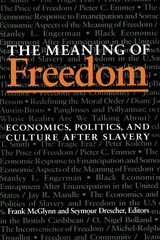
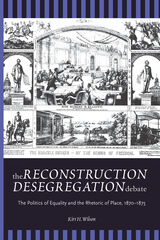
In the decade that followed the Civil War, two questions dominated political debate: To what degree were African Americans now “equal” to white Americans, and how should this equality be implemented in law? Although Republicans entertained multiple, even contradictory, answers to these questions, the party committed itself to several civil rights initiatives. When Congress passed the Thirteenth Amendment, the 1866 Civil Rights Act, the Fourteenth Amendment, and the Fifteenth Amendment, it justified these decisions with a broad egalitarian rhetoric. This rhetoric altered congressional culture, instituting new norms that made equality not merely an ideal,but rather a pragmatic aim for political judgments.
Kirt Wilson examines Reconstruction’s desegregation debate to explain how it represented an important movement in the evolution of U.S. race relations. He outlines how Congress fought to control the scope of black civil rights by contesting the definition of black equality, and the expediency and constitutionality of desegregation. Wilson explores how the debate over desegregation altered public memory about slavery and the Civil War, while simultaneously shaping a political culture that established the trajectory of race relations into the next century.
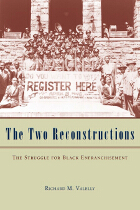
The Reconstruction era marked a huge political leap for African Americans, who rapidly went from the status of slaves to voters and officeholders. Yet this hard-won progress lasted only a few decades. Ultimately a "second reconstruction"—associated with the civil rights movement and the Voting Rights Act—became necessary.
How did the first reconstruction fail so utterly, setting the stage for the complete disenfranchisement of Southern black voters, and why did the second succeed? These are among the questions Richard M. Valelly answers in this fascinating history. The fate of black enfranchisement, he argues, has been closely intertwined with the strengths and constraints of our political institutions. Valelly shows how effective biracial coalitions have been the key to success and incisively traces how and why political parties and the national courts either rewarded or discouraged the formation of coalitions.
Revamping our understanding of American race relations, The Two Reconstructions brilliantly explains a puzzle that lies at the heart of America’s development as a political democracy.
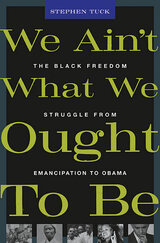
In this exciting revisionist history, Stephen Tuck traces the black freedom struggle in all its diversity, from the first years of freedom during the Civil War to President Obama’s inauguration. As it moves from popular culture to high politics, from the Deep South to New England, the West Coast, and abroad, Tuck weaves gripping stories of ordinary black people—as well as celebrated figures—into the sweep of racial protest and social change. The drama unfolds from an armed march of longshoremen in post–Civil War Baltimore to Booker T. Washington’s founding of Tuskegee Institute; from the race riots following Jack Johnson’s “fight of the century” to Rosa Parks’ refusal to move to the back of a Montgomery bus; and from the rise of hip hop to the journey of a black Louisiana grandmother to plead with the Tokyo directors of a multinational company to stop the dumping of toxic waste near her home.
We Ain’t What We Ought To Be rejects the traditional narrative that identifies the Southern non-violent civil rights movement as the focal point of the black freedom struggle. Instead, it explores the dynamic relationships between those seeking new freedoms and those looking to preserve racial hierarchies, and between grassroots activists and national leaders. As Tuck shows, strategies were ultimately contingent on the power of activists to protest amidst shifting economic and political circumstances in the U.S. and abroad. This book captures an extraordinary journey that speaks to all Americans—both past and future.
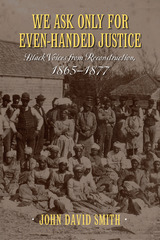
The years following Appomattox offered the freed people numerous opportunities and challenges. Ex-slaves reconnected with relatives dispersed by the domestic slave trade and the vicissitudes of civil war. They sought their own farms and homesteads, education for their children, and legal protection from whites hostile to their new status. They negotiated labor contracts, established local communities, and, following the 1867 Reconstruction Acts, entered local, state, and national politics.
Though aided by Freedmen's Bureau agents and sympathetic whites, former slaves nevertheless faced daunting odds. Ku Klux Klansmen and others terrorized blacks who asserted themselves, many northerners lost interest in their plight, and federal officials gradually left them to their own resources. As a result, former Confederates regained control of the southern state governments following the 1876 presidential election.
We Ask Only for Even-Handed Justice is a substantially revised and expanded edition of a book originally published under the title Black Voices from Reconstruction, 1865–1877.
READERS
Browse our collection.
PUBLISHERS
See BiblioVault's publisher services.
STUDENT SERVICES
Files for college accessibility offices.
UChicago Accessibility Resources
home | accessibility | search | about | contact us
BiblioVault ® 2001 - 2024
The University of Chicago Press









